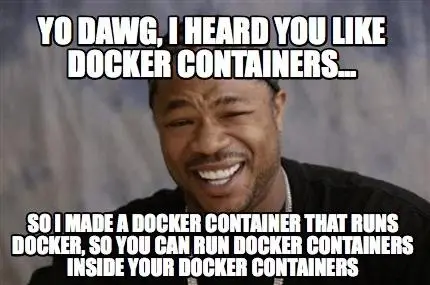Ditch dev containers, switch to Devbox
Dev containers are slow, fragile, and lock you in a VM. Devbox gives you isolated environments that just work.
You add a dev container to your project. Build takes 10 minutes. You change one dependency. Rebuild. Another 10 minutes. Your disk fills up with layers. Your filesystem is slow because everything goes through Docker mounts
A teammate can’t run it because their Docker daemon crashed. Someone else can’t access their SSH keys because they’re outside the container. You spend 2 hours debugging volume mounts
Devbox gives you isolated environments in seconds. No containers. No builds. No mounts. Your tools are there when you cd into the project

Dev containers are expensive overhead
I’ve watched teams waste hours on dev container issues
The container won’t build because a base image changed. The volume mount is slow so tests take 3x longer. You can’t access your dotfiles without copying them in. Your Git config doesn’t work because it’s on the host
Every team member needs the same Docker version. The same settings. The same mounts configured. Miss one detail and things break differently for them
Then someone updates the Dockerfile. Everyone rebuilds. 15 minutes each. That’s the whole team blocked
Oh, and if you use IntelliJ? Dev containers require an Ultimate subscription. VS Code gets it free. JetBrains charges $169/year for the privilege of using a dev container. That’s $169 to make your IDE slower
The fundamental problem: dev containers enforce an arbitrary environment defined imperatively in a Dockerfile. You have to build it, launch it, wait. Sometimes it fails halfway through
What Devbox does differently
Devbox creates isolated shells using Nix packages. No virtualization. No container runtime. Just a shell with your tools
# Install
curl -fsSL https://get.jetify.com/devbox | bash
# In your project
devbox init
devbox add go@1.21 nodejs@20 postgresql@15
devbox shellYou get a shell with Go 1.21, Node 20, and Postgres 15. Isolated from your system. Same versions for everyone
The config is 10 lines:
{
'packages': [
'go@1.21',
'nodejs@20',
'postgresql@15'
],
'shell': {
'init_hook': [
'echo 'Dev environment ready''
]
}
}No Dockerfile. No build step. No image layers. Nix downloads the exact packages you need and puts them in your PATH
It’s automatic with direnv
Add a .envrc file:
eval '$(devbox generate direnv)'Run direnv allow. Now when you cd into the project, your shell automatically loads the right tools
cd ~/project
# Environment loaded automatically
go version # 1.21
node --version # 20
cd ~/other-project
# Different environment
go version # 1.20 (or not installed)No devbox shell command. No activation. Just cd and your tools are there
Combined with shell hooks, you can auto-start services:
{
'packages': ['postgresql@15', 'redis@7'],
'shell': {
'init_hook': [
'pg_ctl start -D .devbox/postgres',
'redis-server --daemonize yes'
]
}
}Services start when you enter the directory. Stop when you leave. Completely automatic
No container means no container problems
Your filesystem is your filesystem
No mounts. No volume drivers. No permission issues. Your editor sees the real files. Your tools run at native speed
Your configs work
Git uses your .gitconfig. SSH uses your keys. Your shell history persists. Your aliases work. Everything’s normal
No builds
Change a dependency? Add it to devbox.json. Run devbox shell. It downloads in seconds. No rebuilding a 2GB image
Reproducible without the pain
Nix pins exact package versions. Your teammate runs devbox shell and gets identical tools. No ‘works on my machine’
A client had a Django app in a dev container. Building took 12 minutes. Docker Desktop used 8GB RAM. Half the team disabled it to save battery
Switched to Devbox. Same Python version, same Postgres, same Redis. Load time: 3 seconds. RAM: normal system usage. Everyone’s battery life improved
When you still need containers
Devbox isn’t for running your app in production. It’s for development
For deployment, Devbox can generate Dockerfiles:
devbox generate dockerfileCreates a minimal container with your exact dependencies. Build it once for deployment
Use Devbox locally. Fast, native, no overhead. Build containers for production when you need them
Devbox works with everything you have
Already using Docker Compose for databases? Keep it:
{
'packages': ['nodejs@20', 'python@3.11'],
'shell': {
'init_hook': ['docker-compose up -d']
}
}Your app runs natively with Devbox tools. Databases run in Compose. Best of both
Need the exact dev container spec for CI? Devbox generates that too:
devbox generate devcontainerCreates a .devcontainer folder. VS Code users who want containers can use it. Everyone else uses Devbox
Getting started
Install Devbox:
curl -fsSL https://get.jetify.com/devbox | bashIn your project:
devbox init
devbox add python@3.11 nodejs@20
devbox shellYou’re in an isolated shell. Python 3.11 and Node 20 available. Exit and they’re gone from your PATH
Add direnv for automatic activation:
devbox generate direnv > .envrc
direnv allowNow just cd into the project. Tools load automatically
Your team clones the repo, runs devbox shell. They get the same environment. No Docker. No build wait. No troubleshooting mounts
Dev containers solve the wrong problem. They containerize the environment when you just need consistent tools. Devbox gives you consistent tools without the container tax
Your laptop stays fast. Your filesystem stays normal. Your tools load in seconds. That’s how dev environments should work
Enjoyed this article? Share it!




